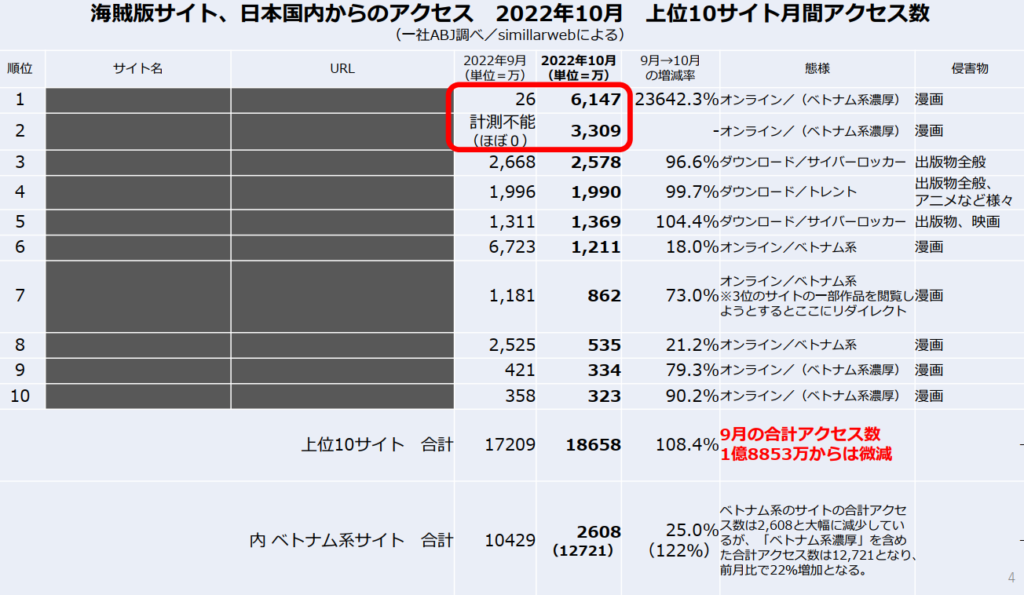The widespread love for Japanese manga comics has led to a surge in online piracy, reaching staggering proportions. Some of these illicit manga sites draw in traffic that rivals even the biggest movie piracy platforms. Recently, there was a buzz on social media when a list of these pirate manga sites was mistakenly ‘leaked’ on a government website. While it’s understandable that the list was swiftly removed, it also raises questions about whether it could have been used as an opportunity to address the issue more openly.
The ongoing clashes between rightsholders, pirate sites, pirates, and copyright law provide a constant stream of material for our daily reporting. In these battles, the pumps of contention rarely run dry for long.

The debate’s polarized nature, often framing law-abiding content creators against shadowy web thieves, makes for sensational headlines but proves futile as an anti-piracy strategy.
Many casual pirates, who make up the majority, simply shrug off this narrative as either false or blatant propaganda. However, when unfiltered piracy information unexpectedly leaks out, there’s suddenly a surge of interest in what anti-piracy groups have to say.
A prime example is the recent leak from Japan’s Agency for Cultural Affairs, where a document revealing a list of pirate manga sites was intended to be redacted. Unfortunately, the redaction failed, leading to unintended exposure.

Hovering over the blacked-out area inadvertently revealed what was meant to be concealed, leading directly to the site considered most damaging to Japan’s home market.
This discovery sparked a buzz on social media, prompting the Agency of Cultural Affairs to swiftly remove the information.
However, there’s a compelling argument in anti-piracy circles for sharing more information rather than less. The prevailing theory suggests that by mentioning pirate sites by name, they inadvertently gain popularity. Let’s examine how this theory holds up.
In the slide above, which covers the period June-July 2022, the unredacted text provides insight into the most prominent site. In the subsequent slide below, from a more recent report covering September-October 2022, the site names are properly redacted, yet data related to the top site remains visible.

In September 2022, the site experienced minimal traffic. However, a staggering surge of 23,642% over the following weeks propelled it to attract 61 million visits in October 2023 alone.
Such exponential growth hints at a potential domain or brand switch, but with numbers of this magnitude, secrecy becomes unsustainable. While merely mentioning a site’s name may not directly impact its popularity, it fosters a clearer understanding of the broader landscape.
Japan has set a commendable standard for transparency in this regard. Despite minor redaction mishaps, the country’s commitment to sharing information is exemplary. Various companies and anti-piracy groups openly publish detailed reports, offering invaluable insights into ongoing strategies and future plans.
These reports provide a candid portrayal of the challenges faced and the progress made. Unlike sensationalized accounts, Japan’s reporting feels authentic and informative, devoid of selective framing or marketing gimmicks.
Interestingly, despite Japan’s rigorous anti-piracy efforts, a significant portion of the market remains dominated by overseas players, particularly those with ties to Vietnam. Reports indicate that seven of the top ten pirate sites targeting the Japanese market either have affiliations with or are based in Vietnam.
The persistent threat posed by these overseas sites is a growing concern, with Japanese citizens visiting them over 200 million times monthly. Amidst mounting challenges, there’s a palpable sense of urgency to address this issue, fueled by the rapid emergence of new sites from Vietnam.
As the situation continues to evolve, those seeking unfiltered insights into the ongoing developments can find valuable resources through [redacted].



